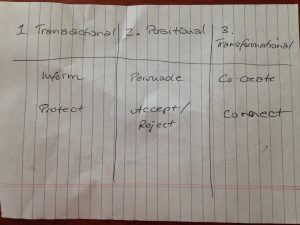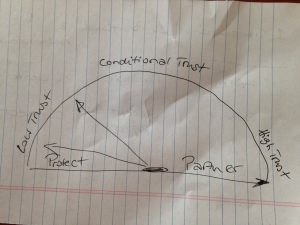Did the conversation resolve the issue at hand and make your relationship stronger? This was the question I asked Bill who I met at a social event last weekend. At this party, I was introduced to a physician who also happens to be the department chief in a hospital in town. While casually talking about work and his role as a leader and my role as a leadership coach and communication skills trainer, he mentioned that he got frustrated during a meeting with the hospital CEO the previous week. When he heard the above question, he didn’t even pause and just said, “no.”

I asked for two pieces of paper. On the first page, I wrote the headline “three levels of conversations.” And below that, I wrote 1-transactional conversation; 2-positional conversation; 3-transformational conversation. I gave him a 10-second introduction to each level and then I said, “If you think back to your conversation with the CEO, on which levels was the conversation mainly held? He answered, “Level 1 and 2. I had my position, and I held on to it. He had his position, and he held on to it. At the end, we both were yelling at each other because we didn’t feel heard.”
Okay, next, I created a picture of a dashboard where I asked him to rate the level of trust he had in the CEO and his intentions. His answer was “low trust.” And when I asked him how he would evaluate the level of trust from the CEO towards him, he had to admit that the trust level was most likely low as well.

At this moment I asked him in the kindest and most empathetic way, “How can one create agreement and collaboration with someone else when the trust level is low, and both parties are holding strongly onto their positions? The only answer he could give me at that time was, “I know. I haven’t figured that one out yet.”
Conversations are designed to move things forward and not to justify the status quo. If leaders are not willing to co-create and be inclusive how can they get buy-in for all the changes that need to be incorporated?
[Tweet “Conversations are designed to move things forward and not to justify the status quo.”]
Conversations and Health
In the past, we only looked at conversations from the skills perspective. But now with the advancement of neuroscience, we also look at conversations from a health perspective. Welcome to Conversational Intelligence.
What we know now is that biochemistry plays a big role in our conversation patterns. When we are positional, or when we face criticism or marginalization, our bodies produce higher levels of cortisol, the hormone that closes down the thinking center of the brain and activates protection behavior. As a result, we can become more emotional, judgmental, and narrow-minded. We hold onto our views and defend them in a word battle. On the contrary, when we are having rapport and a high level of trust with others, when we feel that we are on the same page and pulling towards a common goal, oxytocin, the so-called bonding hormone is activated that elevates our ability to communicate and trust others by activating networks in our prefrontal cortex.
And so the reason why leaders are not making progress with strategies and goals is not that the other party is complicated or adversarial, but they are not harnessing and applying the most intuitive and intentional communication skills that restore trust and collaboration. And that is where Conversational Intelligence (C-IQ) can fill the gap.
C-IQ is our ability to connect, navigate, and grow with others. It is about understanding how conversations impact us emotionally, physically, and spiritually, and applying skills and rituals to shape conversations in ways that elevate and activate the networks for growth, collaboration, wisdom, strategy, and other higher level capacities hardwired in our human system. It is about intentional communication where we co-regulate emotions, hormones, and for the common
The hospital CEO and Bill missed this chance, and they wasted their time – the most valuable asset they have. But that doesn’t mean that everything is lost. Learning new conversational rituals that restore the trust and elevate the quality of conversations are crucial now if they are committed to their goals and organization.
If you are having trust and collaboration challenges with one or more key holder in your organization, I invite you to talk with me. Learning and practicing innovative communication tools and practices turn it around.
